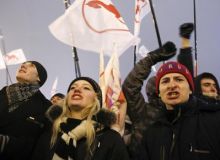Nothing in common, at first sight, considering that the situations in these countries are actually very different, in terms of government position and public moods. However, a closer look, regardless of what the official channels say, shows that there is something in common. But on this further on.
Many will remember the way the presidents of Russia and Belarus behaved, scared stiff by what was happening on the Maidan during the
Orange Revolution. Putin and Lukashenko made statements that would suffice for a two-volume publication, entitled something like “Russia and Belarus Are Not Ukraine.”
Life shows that you will inevitably face the biggest fear of all, especially in the case of ranking politicians, who eventually hear what their electorates actually have to say about them.
In the Russian Federation, this led to the recent public unrest, described by most of the media as “fascist” outbursts — this adjective saves hundreds of pages in print or words on air. Belarus? The situation in that country was lively discussed last night and Vitalii Portnikov, a noted Ukrainian journalist, wrote on his Facebook page: “I am not sure if I should feel surprised about what happened in the capital of Belarus, during the presidential elections. This was something well to be expected, with a politician remaining in power, who wants to have it ad infinitum, who bends every law to make his fellow citizens cast their ballots for him — or else… Power is Lukashenka’s idee fixe.”
Following Portnikov’s comment, other analysts agreed that this was the end and means. Hard to argue, least of all after browsing through Belarus’ abundant official online commercials last Sunday. One of the presidential candidates addressed a rally of protest, without a mike, saying, “We’ve just been told that there will no arrests. They’re bullying us. Have no fear. This isn’t as bad as it looks!”
As it was, the man in street wasn’t scared. Those in power were. Indeed, it proved far easier to scatter a rally of 20,000 (sic), using the militia’s anti-riot squads, rather than win the electorate’s support. Time will show how long such forceful methods will keep the current Belarusian government in power. The fact remains that a new generation has emerged over the past 20 years in Belarus: people who need changes on the physiological level. There is no denying the possibility of their actively negative attitude to the head of state in his fourth term, something unprecedented in world practice. What is in common between the public unrest in Moscow, Minsk, and that unmatched brawl at the Verkhovna Rada in Ukraine? Rallies of protest (however effective), even though in Kyiv this boiled down to a fistfight in parliament. These are just the first steps. All domestic analysts agree that the mood for protest is growing in Ukraine, for a number of reasons. Soaring consumer and utility costs apart, the following points seem clearly apparent:
(a) Viktor Yanukovych beat Yulia Tymoshenko with several percent of votes, so when those MPs of the Party of Regions fought and threw their BYuT colleagues out of the VR audience, they shut the door not only for Bondarenko, Volynets, and Kozhemiakin, but also for millions of Ukrainians who had cast their ballots for Yanukovych. Ukrainians are still watching, being wise people — as often stressed by the speaking heads of all factions in the Ukrainian Parliament. It is true, but it is also true these people aren’t likely to keep looking on as such acts take place, very much like what took place in the “wild” 1990s. Their public protest is on an upward curve, something Yanukovych and his team should be aware of and take every effort to reestablish civilized contact with the coalition instead of slamming heavy chairs on its members’ heads.
After all, contacts with the coalition will determine the current administration’s life span. There is no way to carry out unpopular reforms without popular support. A great number of Ukrainians explicitly distrust their government. Those in power, instead of winning popular confidence and building the president’s image, allow such brawls to happen in full public view. Graphic evidence of this inapt strategy is found in the results of the 2010 local elections, particularly in the southern and eastern regions of Ukraine.








